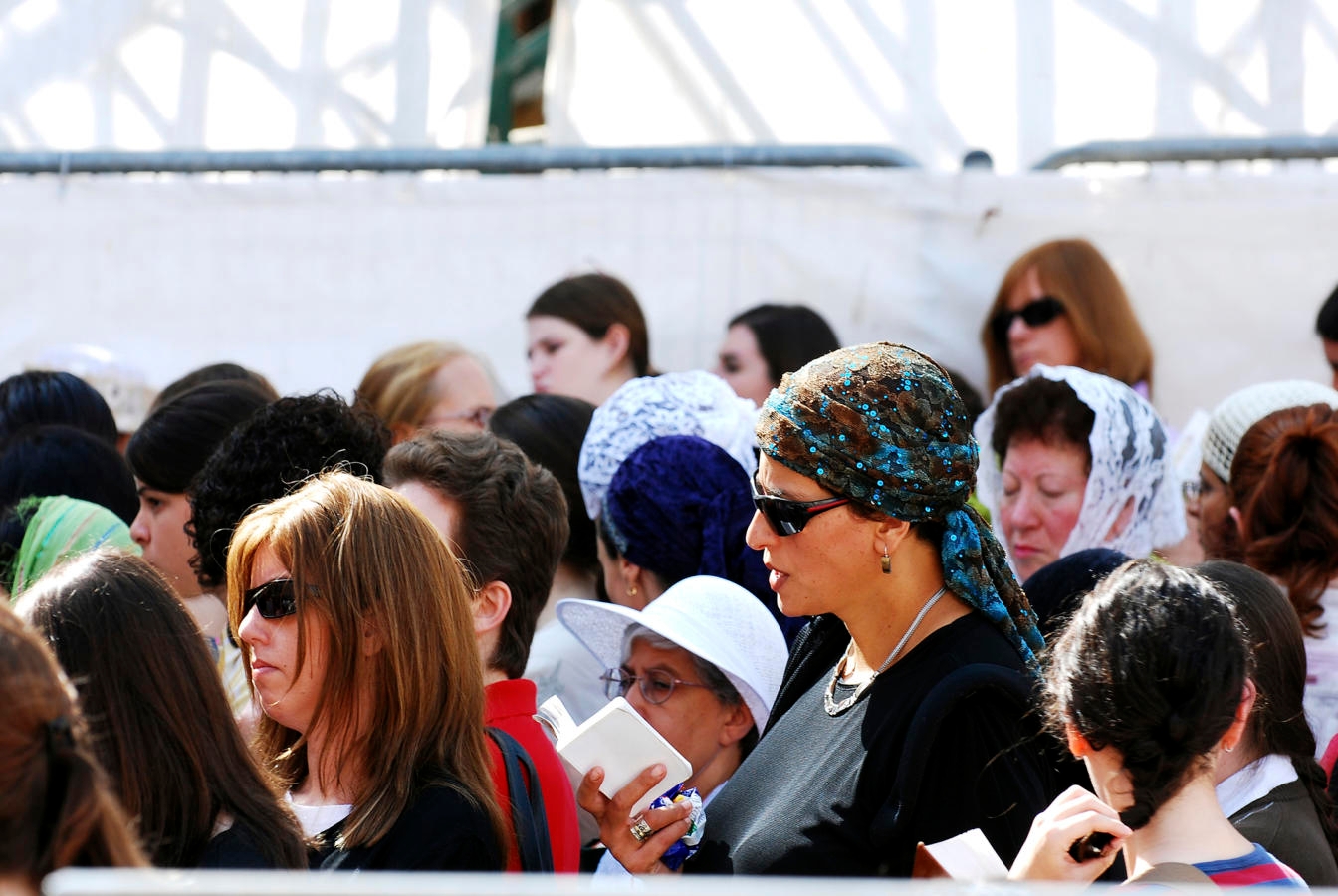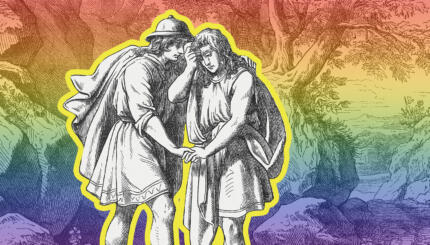With the arrival of feminism in public discourse in the mid-20th century, religion–including Judaism–came under criticism for its gender-determined roles, its exclusion of women from communal life, and its apologetics that tried to justify women’s domestic positions.
Many early feminists were skeptical of institutionalized religion, and indeed, some believed that there was no way to salvage Western religion from its androcentrism. These feminists criticized Judaism for constructing a male God and an irrevocably patriarchal culture. However, by the 1970s, other feminists began creating theologies that blended Judaism and feminist principles.
Confronting a Male God
In a 1976 article (“Female God Language in a Jewish Context,” Davka Magazine 17), Rita M. Gross addressed the issue of male God imagery and vocabulary in prayer. In this article, Gross discusses the theological implications of referring to God exclusively with the pronoun “He.” Gross acknowledges that female pronouns for God are equally inadequate; in fact, clinging too much to the idea of an anthropomorphized, gendered deity borders on idolatry, she wrote. However, Gross promotes alternating the usage of male and female pronouns not because God has gender, but because people do, and the ability to relate to language has a direct impact on the ability to relate to God.
Others expanded the feminist critique of religious language and looked at the masculine imagery traditionally used to describe God’s relationship with humanity. Arthur Green notes the feminine attributes and images in biblical and classical rabbinic texts. Not only is God King, Warrior, Judge, and Father; God is also the deity that is Imminent, the Source of Compassion (the Hebrew term for “compassion” resembles the word for “womb”), and Mother. Green’s approach–one shared by a number of feminist theologians–attempts to uncover aspects of traditional Jewish thought consistent with feminism, instead of totally reconfiguring Judaism in a way that divorces it from the past.

Help us keep Jewish knowledge accessible to millions of people around the world.
Your donation to My Jewish Learning fuels endless journeys of Jewish discovery. With your help, My Jewish Learning can continue to provide nonstop opportunities for learning, connection and growth.
Jewish Goddess Worship
On the other hand, there are scholars who do, indeed, break from traditional Jewish theology. While some feminists like Penina Adelman cling, for example, to the mystical representation of God’s imminence–a feminine divine attribute known as Shekhinah–others challenge the use of this and other feminine images that are defined in relationship to male ones (particularly those kabbalistic images which are often negative).
In an effort to break from a Jewish God perceived as masculine, some feminists such as Savina Teubal turn to explicitly pagan goddess traditions among the ancient Israelites, many of which were condemned in the Torah. They claim that these counter-traditions are representative of a fundamentally “female” religious drive. The less radical of these theologians attempt to reveal divine qualities recognized as feminine and embodied in Goddess worship, and then attach them to the God of Israel in order to bring greater balance to the Jewish perception of God.
Transcendence is Male
Perhaps a greater challenge to mainstream Jewish theology is the work of feminists, including Judith Plaskow, who reject God’s transcendence as a masculine construct that manifests a hierarchical world-view. This idea is based on a much-debated feminist assumption that hierarchical models of society are intrinsically male and foreign to feminine cultures.
On this basis, Plaskow challenges the assumption that God is an “Other,” asserting that the core perception of God as a transcendent, distant, male Being is the root cause of women’s suppression in Judaism. Believing Judaism to be fundamentally infused with patriarchy, Plaskow rejects the ability of traditional theology to reflect the values of feminism. Instead of focusing on things like ritual and law, Judaism needs to be remodeled from the foundation up. In Plaskow’s mind, God is more spirit than personality, and until Judaism reconfigures itself around this “feminized” model, any changes in Judaism will be merely superficial.
However, some mainstream theologians such as Elliot Dorff (himself sympathetic to the message of feminism), disagree with the rejection of divine transcendence, pointing out that God can only be God if experienced as being beyond the human. In this understanding, God’s superior position does not represent a male cultural construct; rather, it is a function of the nature of divinity. God’s transcendence coexists with God’s imminence.
Injecting Women Into Judaism
Instead of seeking out essentially “feminine” religious expressions, some feminists seek to add women’s voices (both past and present) into Judaism and balance out the genders in ways that build upon tradition with innovation.
Rachel Adler exemplifies this approach. A scholar of and Jewish law, Adler uses Judaism’s own tools in trying to bring equal status to women. Instead of emphasizing a past revelation at Sinai that spoke to ancient Israelites and early rabbinic Jews, Adler believes that Judaism should focus on using its ideals to build a future for the Jews of today. By working within the tradition, Adler feels that she is engaged in a continuing revelation of God’s will, one that holds that men and women are of equal status.
For example, Adler–rejecting a perceived objectification of women inherent in traditional Jewish marriage (the language of acquisition, the inability of women to dissolve the marriage)–constructs an alternative model based on the commitment of business partners who both bring contributions in the creation of a new entity. Adler’s ritual is also practical for homosexual couples.
Feminism For Men
More recently, feminist scholars have challenged the tendency to make generalizations about what it means to be male and female. Instead of identifying the “male” gender exclusively with men and the “female” gender exclusively with women, there has been a shift to understanding that both God and humans (being in the divine image) have aspects associated with both genders. This is so because gender (as opposed to “sex”) is largely a cultural construct.
Indeed, from feminism has been born a reassessment of male gender roles (championed by Daniel Boyarin) and a trend in certain circles (largely influenced by Arthur Waskow) toward embracing androgyny. Not only has the work of feminists given women greater access to the previously male realm of religion; it has also freed men to express the aspects of their spirit that do not adhere to the traditional expectations of men. For many men, it is just as powerful a revelation to recognize God’s maternal qualities as it is for women. From the perspective of these scholars, both men and women can be enriched by the feminist critique.
<!–Rabbi Rachel L. Miller is a Conservative rabbi and educator living in the San Francisco Bay area. In 2001, she received her ordination from the Ziegler School of Rabbinic Studies at the University of Judaism. She currently serves as Educational Director at Congregation B’nai Shalom in Walnut Creek.
–>



